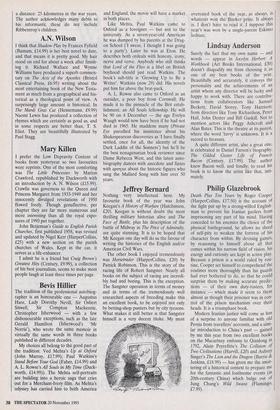Philip Glazebrook
Death Plus Ten Years by Roger Cooper (HarperCollins, £17.50) is the account of the fight put up by a strong-willed English- man to prevent his Iranian gaolers from imprisoning any part of his mind. Having conceded to his enemies the choice of the physical battleground, he allows no shred of self-pity to weaken the fortress of his character from within. By devising games, by reasoning to himself about all that comes within his narrow field of vision, his energy and curiosity are kept in active play. Because a prison is a world ruled by rou- tine, Cooper set himself to comprehend the routines more thoroughly than his guards had ever bothered to do, so that he could surprise them by making accurate predic- tions — of their own duty-rosters, for instance — which made it seem to them almost as though their prisoner was in con- trol of the prison mechanism over their heads. It is a triumphant book.
Modern Iranian justice will come as less of a surprise to anyone familiar with old Persia from travellers' accounts, and a simi- lar introduction to China's past — gained by me this year from two excellent books on the Macartney embassy to Qianlong in 1792, Alain Peyrefitte's The Collision of Two Civilisations (Harvill, £20) and Aubrey Singer's The Lion and the Dragon (Barrie & Jenkins, £18.99) — has given me the smat- tering of a historical context to prepare me for the fantastic and loathsome events (in 20th-century China) which bulge out of Jung Chang's Wild Swans (Flamingo, £7.99).










































































 Previous page
Previous page